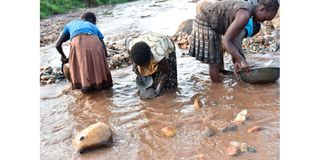It’s 2022 but GBV remains rampant in West Pokot

Women mining gold at a river in Sekerr, West Pokot County, in this file photo. The county has a 6.8 per cent gender-based violence prevalence rate, with women bearing the brunt.
What you need to know:
- GBV still rampant in most pastoral communities due to high illiteracy level among women.
- Girls and women in the region are ignorant about their rights, jeopardizing efforts to deal with the vices.
Cases of gender-based violence (GBV) are still rampant in most pastoral communities due to high illiteracy level, non-governmental organizations championing for women rights have revealed.
They say that apart from retrogressive cultural practices, girls and women in the region are ignorant about their rights, jeopardizing efforts to deal with GBV cases. Most victims do not even know where to go when abused.
West Pokot County, for instance, has a 6.8 per cent GBV prevalence rate while the national figure stands 9.2 per cent according to the survey by the National Crime Research Centre of 2018.
More than 60 per cent of GBV cases in the county go unreported, leaving victims without justice. The cases became more rampant at the peak of Covid-19.
Acceptance of violence as a ‘private affair’ in these communities prevents outsiders from intervening and prohibits women from reporting.
IREP Foundation Director Domitillah Chesang’ says most GBV perpetrators are never prosecuted, a situation that has negatively affected the fight against the vice in the region.
Speaking in Kongelai area in West Pokot during a women’s forum last week, Ms Chesang’ said GBV has enslaved women and girls in the region, with majority thinking their voices cannot be heard.
Illiteracy level
Ms Chesang’ noted that defilement and rape cases are alarmingly high, adding that the war against the vice cannot be realised if women are not empowered on their rights.
The organization also revealed that the county’s illiteracy level is more than 67 per cent with women as the majority.
"School retention is very low because girls are married off at a very early age. The government should step up and build rescue centres for girls to protect them against early marriages," said Ms Chesang’.
She asked the government to roll out advocacy programs in the region to increase school enrolment among girls.
The anti-FGM crusader urged the community to discard primitive cultures like female genital mutilation (FGM) and early and forced marriages that continue to plague young girls.
“We want women and girls to enjoy equal rights. We need to sensitize the community to protect women,” said Ms Chesang’.
She added that the menace cannot end if women are not educated on their rights, adding that they (women) should form groups that will help them acquire resources to empower themselves.
"We want to empower our women at the grassroots level to help them fight these retrogressive practices that demonize them in the Pokot community," she said.
Permanent disability
A community development facilitator Emily Partany, said cases of violence against women go unreported, yet many have lost their lives at the hands of the perpetrators.
“All these cases should be reported for women to get justice. Many are tortured by their spouses since they are regarded as children in most of pastoral communities,” she said.
Ms Partany pointed at a recent case where a woman sustained permanent disability after a domestic quarrel with her husband.
“We want elected leaders including chiefs and elders at the grassroots, to protect women against violence,” she said.
The community activist said they will continue with the fight despite the resistance from some locals.
“The battle is still on because we must protect women’s rights,” said Ms Partany.
County Gender Officer Emanuel Oigo, challenged local chiefs and their assistants to scale up the war against all forms of violence including FGM and sexual and gender-based violence (SGBV) in their localities.
He challenged the administrative leaders to support President Uhuru Kenyatta’s commitment to ensure zero tolerance to all forms of GBV by the end of 2022.
“I urge you to increase awareness about the harmful effects of FGM and to end sexual and gender-based violence that has affected the welfare and dignity of women and girls in your villages,” Mr Oigo said.





